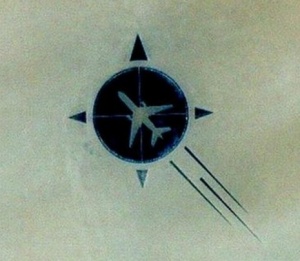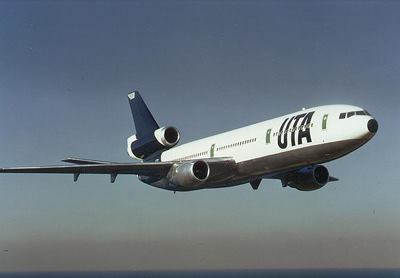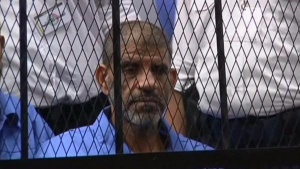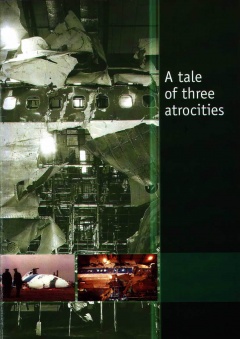UTA Flight 772
 Satellite image of UTA Flight 772 memorial built in the Sahara Desert | |
| Date | 19 September 1989 |
|---|---|
| Location | Niger |
| Coordinates | 16°51′53.748″N 11°57′13.362″W / 16.86493000°N 11.95371167°W Fatal error: The format of the coordinate could not be determined. Parsing failed. |
| Type | |
| Deaths | 170 |
| Interest of | Charles Norrie, Pierre Péan |

UTA Flight 772 of the French airline Union des Transports Aériens was a scheduled flight operating from Brazzaville in the Republic of Congo, via N'Djamena in Chad, to Paris CDG airport in France. On Tuesday, 19 September 1989 the McDonnell Douglas DC-10 aircraft registered N54629 took off from N'Djamena International Airport at 13:13. Forty six minutes later, at its cruising altitude of 30,000 ft, an explosion caused UTA Flight 772 to break up over the Sahara Desert near the towns of Bilma and Ténéré in Niger, West Africa. All 155 passengers and 15 crew members died.[1]
Where UTA Flight 772 fell in the Sahara Desert, the families of the victims built a lasting and visually striking memorial to the dead. A life-size silhouette of the aircraft lies inside a dark stone circle surrounded by 170 broken mirrors, each one representing someone who died. Jutting out at the northern point, like a sundial, stands the right wing of the DC-10 aircraft.[2]
UN Security Council Resolution 748, adopted unanimously on 31 March 1992, introduced mandatory sanctions calling upon Libya to comply with requests to hand over two Libyan suspects in the destruction of Pan Am Flight 103 over Lockerbie on 21 December 1988 and to cooperate with the investigation of the sabotage of UTA Flight 772 over Chad and Niger on 19 September 1989.[3]
According to Lockerbie campaigner Barry Walker:
- "In the 'official' version of events, the UTA 772 case demonstrates a pattern of Libyan behaviour. For some who dispute Libyan responsibility for Lockerbie there is also a suspicion that evidence in the UTA 772 case was manipulated to implicate Libya, perhaps even to ensure French support, as a permanent member of the Security Council, for sanctions.
- "There are similarities between the UTA 772 case and Lockerbie as well as significant differences, not only in the way the investigation was conducted but in the different method by which UTA 772 was attacked. The evidence in the UTA 772 case against the six Libyan officials eventually convicted is essentially circumstantial and sometimes quite flimsy. There appears to be stronger evidence against other Libyan officials and a Congolese who were not charged."[4]
Contents
Victims
On the flight deck were Captain Georges Raveneau, as instructor; First Officer Jean-Pierre Hennequin in training; safety pilot Michel Crézé; and Flight Engineer Alain Bricout. In the cabin were Pursers Jean-Pierre Baschung and Michele Vasseur, along with Flight Attendants Alain Blanc, Laurence de Boery-Penon, Martine Brette, Anne Claisse, Nicole Deblicker, Ethery Lenoble, Gael Lugagne, Veronique Marella, Jean-Pierre Mauboussin.
Among the killed passengers was Bonnie Pugh, wife of the American ambassador to Chad at the time, Robert L. Pugh.
Chadian Planning Minister Mahamat Soumahila was also aboard, bound for the annual meeting of the International Monetary Fund in Washington.
The victims came from 18 different countries, the majority being French or Congolese nationals: 54 French, 48 nationals of Republic of Congo, 25 Chadians, 9 Italians, 7 Americans, 5 Cameroonians, 4 Britons, 3 nationals of Zaire (Democratic Republic of the Congo), 3 Canadians, 2 Central Africans, 2 Malians, 2 Swiss, 1 Algerian, 1 Bolivian, 1 Belgian, 1 Greek, 1 Moroccan and 1 Senegalese.
After the plane was bombed, Leonardo Leonardi, a spokesperson for the Italian Embassy in Paris, said that the embassy believed that six Italians were on the flight. A spokesperson of the Capucin religious order said that two members of the order were on board the aircraft.[5]
Remembering Tony Norrie
In 2009, Charles Norrie published a booklet entitled "A tale of three atrocities" in which he paid a tribute to one of the British victims:
- My brother Tony was murdered in a Libyan terrorist attack. He was travelling on UTA Flight 772 between N'Djamena in Chad, where he worked in oil field development, and Paris. When he died, he was returning to the UK via Paris to participate in a gliding competition in Scotland. He lived for gliding and loved the air. He had even represented Guernsey at the 1982 World Gliding Championships. The latter seems an odd achievement because I didn't know he had a connection to the place. So it was a tragic irony that he should meet his death in the beastly destruction of an aircraft. I like to think he was sitting back with a gin and tonic in his hand just before he died. Perhaps he was thinking of pleasant air adventures ahead.
- My brother was a long-standing member of Lasham Gliding Club, near Alton in Hampshire. His life was centred on the airfield and close friends living in and near the town who were devoted to the sport. He repaid that friendship in his will, leaving them sufficient money to build a workshop at the airfield. The Club has named the workshop in his memory. They also established a "Tony Norrie" award for the best two-seater flight of the year. These people, to my mind, constituted his "gliding family". To them, I had to bring the sad news of his tragic death. My brother and I were never close. However, when he died, I found he had made me his executor. I asked my mother "Why?". "Because you always have the last word in any argument," she said enigmatically.
- I metaphorically extended the remit of executor to inquire about the circumstances of any tragedy that could have a bearing on his death. So, I settled down to read myself into Lockerbie. Like UTA, Lockerbie was to be attributed to Libya.
- With that thought in mind, I offer these thoughts on Lockerbie twenty years later. The conclusions of my research are shocking. They are also wildly different from anything previously published. Given what Libya did to my brother, my stance may surprise you.[6]
Investigation
An investigation commission of the ICAO[7] determined that a bomb placed in a container in location 13-R in the forward cargo hold caused the destruction of the aircraft. The commission suggested that the most plausible hypothesis was for the bomb to have been inside the baggage loaded at Brazzaville airport. Initial speculation over which groups might have been responsible for destroying UTA Flight 772 centered upon Islamic Jihad, who were quick to claim responsibility for the attack, and the "Secret Chadian Resistance" rebel group, which opposed president Hissen Habré.[8] Five years previously, on 10 March 1984, a bomb destroyed another UTA aircraft from Brazzaville shortly after the DC-8 had landed at N'Djamena airport. There were no fatalities on that occasion and those responsible were never identified.[9]
Wreckage of the aircraft was sent to France for forensic examination, where traces of the explosive PETN (Penthrite) were found in the forward cargo hold. Pieces of a dark grey Samsonite suitcase covered in a layer of PETN convinced the investigators that this was the source of the explosion. It had been loaded in Brazzaville.
Trial in absentia

The French investigators led by Juge Jean-Louis Bruguière obtained a confession from one of the alleged terrorists, a Congolese opposition figure, who had helped recruit a fellow dissident to smuggle the bomb onto the aircraft.[10] This confession led to charges being brought against six Libyans. Juge Bruguière identified them, as follows:
- Abdullah al-Senussi, brother-in-law of Muammar Gaddafi, and deputy head of Libyan intelligence;
- Abdullah Elazragh, Counsellor at the Libyan embassy in Brazzaville;
- Ibrahim Naeli and Arbas Musbah, explosives experts in the Libyan secret service;
- Issa Shibani, the secret agent who purchased the timer that allegedly triggered the bomb; and,
- Abdelsalam Hammouda, Senussi's right-hand man, who was said to have coordinated the attack.
In 1999, the six Libyans were put on trial in the Paris Assize Court for the bombing of UTA Flight 772. Because Gaddafi would not allow their extradition to France, the six were tried in absentia and were convicted.
Alleged motive
The motive usually attributed to Libya for the UTA Flight 772 bombing is that of revenge against the French for supporting Chad against the expansionist projects of Libya toward Chad. Libya was understood to have considered this French support as "neo-colonialist".[11]
The Chadian–Libyan conflict (1978–1987) ended in disaster for Libya following the defeat at the Battle of Maaten al-Sarra in the 1987 Toyota War. Muammar Gaddafi was forced to accede to a ceasefire ending his dreams of African and Arab dominance. Gaddafi blamed the defeat on French and U.S. "aggression against Libya".[12]
Libyan compensation
The Paris court awarded the families of the UTA victims sums ranging from €3,000 to €30,000 depending on their relationship to the dead. Not content with this award, the French relatives' group "Les Familles du DC10 d'UTA"[13] signed an agreement on 9 January 2004 with the Gaddafi International Foundation for Charity Associations accepting a compensation payment of $170 million United States dollars, or $1 million for each of the 170 UTA victims. By 2007-05, it was reported that 95% of this compensation money had been distributed.[14] However, the families of the seven American victims refused to accept their $1 million USD awards and pursued the Libyan government through a federal court in Washington DC. On 19 September 2006, the court was asked to rule that the Libyan government and six of its agents were guilty of the 19 September 1989 destruction of UTA Flight 772. Damages of more than $2 billion USD were claimed for the loss of life and the destruction of the DC-10 jet.[15]
In April 2007, D.C. District Judge Henry H. Kennedy found Libya directly responsible for the bombing and presided over a three day bench trial from 13 August 2007 to 15 August 2007. On 15 January 2008, Judge Kennedy issued an order awarding $6 billion USD in damages to the families and owners of the airliner.[16][17][18] Libya has appealed this decision.
In October 2008 Libya paid $1.5 billion into a fund which will be used to compensate relatives of the
- Lockerbie bombing victims with the remaining 20%;
- American victims of the 1986 Berlin discotheque bombing;
- American victims of the 1989 UTA Flight 772 bombing; and,
- Libyan victims of the 1986 US bombing of Tripoli and Benghazi.
As a result, U.S. President George W Bush signed an executive order restoring the Libyan government's immunity from terror-related lawsuits and dismissing all of the pending compensation cases in the U.S. [19]
Fabricating false evidence
In Manipulations Africaines (African Manipulations), published in February 2001, Pierre Péan investigated the sabotage of UTA Flight 772. He alleged that evidence pointed to Iran and Syria (acting through the Hezbollah movement), but that due to political context (notably the Gulf War), France and the United States tried to put the blame on Libya. He accuses Juge Jean-Louis Bruguière of deliberately neglecting proof of Lebanon, Syria and Iran being involved to pursue only the Libyan trail. He also accused Thomas Thurman, a Federal Bureau of Investigation political operative, of fabricating false evidence against Libya in the sabotage of both Pan Am Flight 103 and UTA Flight 772.[20][21]
Defector claims Libya responsible
On 18 July 2011, former Libyan foreign minister Abdel Rahman Shalgham, who had defected from the Libyan government in March at the beginning of what would become the 2011 Libyan civil war, told al-Hayat that the Libyan government was responsible for the bombing of UTA Flight 772. He stated "The Libyan security services blew up the plane. They believed that opposition leader Mohammed al-Megrief was on board, but after the plane was blown up, it was found that he was not on the plane." He also claimed that "The Lockerbie operation was more complex ... the role of states and organisations has been discussed, and while the Libyan services were implicated, I do not think it was a purely Libyan operation.[22]
Memorial
In 2007 a memorial was created in the desert by Les Familles de l’Attentat du DC-10 d’UTA, an association of the victims’ families. The memorial is constructed of black rock in the shape of the DC10 airplane inside a compass.[23][24]
The memorial is visible in satellite imagery on Google Earth.[25]
Related Documents
| Title | Type | Publication date | Author(s) | Description |
|---|---|---|---|---|
| Document:Call for US to give update on fourth Lockerbie suspect | Article | 18 December 2022 | Kathleen Nutt | Former Justice Secretary Kenny MacAskill: "Britain and America know everything. I want the UK and US to be more open. Libya have offered up Abu Agila Masud. But Masud is smaller beer. The Lord Advocate should find out what progress is being made on bringing Abdullah Senussi to court." |
| Document:Libya: Fine, but why Britain | article | 20 March 2011 | Brian Barder | David Cameron seemingly Gung Ho on toppling the Libyan leader, Muammar Gaddafi, while Barack Obama takes a back seat |
| File:A Tale of Three Atrocities.pdf | report | August 2009 | Charles Norrie | The report suggests that three ostensibly unconnected flight sabotages may in fact be connected. The main focus is the Pan American Airlines Flight 103, downed over Lockerbie in December 1988. It suggested that the CIA facilitated the Lockerbie atrocity by Iranian operatives as a quid-pro-quo for the downing of the Iranian airliner some 5 months earlier. |
References
- ↑ "Court Awards US Victims More Than $6 Billion for 1989 Libyan Terrorist Bombing of French Airliner That Killed 170 People Over African Desert" PR Newswire, 15 January 2008, Retrieved 3 June 2009.
- ↑ "The Sahara memorial seen from space"
- ↑ United Nations Security Council Resolution 748 31 March 1992
- ↑ "The Masonic Verses Part X The Bombing of UTA 772 - 19th September 1989"
- ↑ "Plane with 171 aboard explodes." New Straits Times. Thursday 21 September 1989. Retrieved from Google News (1 of 24) on 27 April 2011.
- ↑ "A tale of three atrocities"
- ↑ "Note" The ICAO is a United Nations agency that does not routinely investigate aircraft accidents, however Korean Air Lines Flight 007 in 1983 set the precedent.
- ↑ "UTA Flight 772: Aviation Safety Network report"
- ↑ "UTA DC-8: Aviation Safety Network report"
- ↑ Les preuves trafiquées du terrorisme libyen by Pierre Péan (Le Monde diplomatique)
- ↑ "The French military role in Chad"
- ↑ "Disputes Raiders of the Armed Toyotas"
- ↑ "Les Familles du DC10 d'UTA"
- ↑ "Over $160 million of Libyan compensation distributed"
- ↑ "Compensation claim by American relatives"
- ↑ "Memorandum, Robert Pugh, et al. v. Socialist People's Libyan Arab Jamahiriya, Civ. Action No. 02-2026-HHK (D.D.C. 15 January 2007)"
- ↑ "U.S. court orders Libya to pay $6 billion for bombing"
- ↑ "U.S. judge orders Libya to pay billions to plane victims", Houston Chronicle, 17 January 2008
- ↑ "Libya compensates terror victims"
- ↑ Les preuves trafiquées du terrorisme libyen
- ↑ [http://mondediplo.com/2001/03/05libya "African Manipulations: Tainted Evidence of Libyan Terrorism"
- ↑ "Ex-foreign minister says Libya behind 1989 airline attack" Al Arabiya, 18 July 2011
- ↑ "Les Familles de l’Attentat du DC-10 d’UTA"
- ↑ "UTA Flight 772 memorial"
- ↑ "UTA Flight 772 Memorial from Google Earth"
External links
- Final report (Archive)
- "Les Familles de l'Attentat du DC10 d'UTA"
- Reynolds, Paul. "UTA 772: The forgotten flight" BBC. Tuesday 19 August 2003.
- "The Masonic Verses Part X The Bombing of UTA 772 - 19th September 1989"
